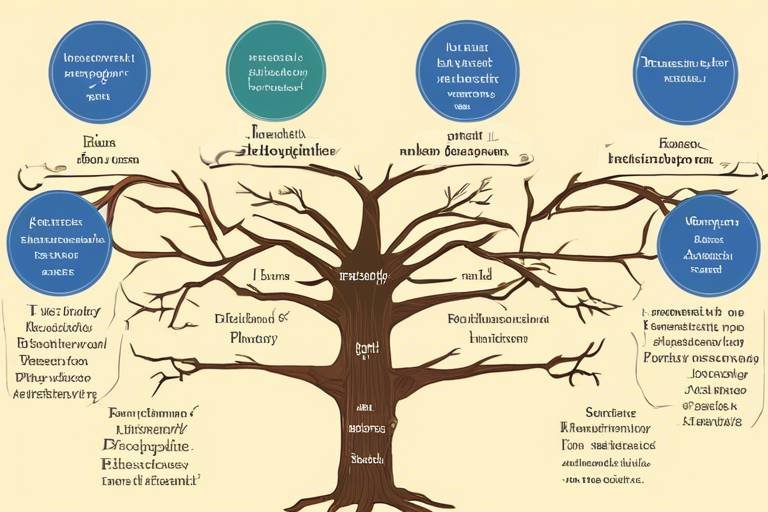The Five Branches of Philosophy - An Overview
Philosophy is like a vast ocean, teeming with thoughts, ideas, and questions that have puzzled humanity for centuries. When we dive into its depths, we discover five main branches that serve as the pillars of philosophical inquiry. These branches—Metaphysics, Epistemology, Ethics, Logic, and Aesthetics—each provide unique insights into our existence and the world around us. Understanding these branches not only enriches our intellectual lives but also helps us navigate the complexities of human thought and experience. So, let’s embark on this philosophical journey, exploring each branch and its significance in the grand tapestry of human understanding.
Metaphysics is the branch that delves into the very essence of reality. It poses profound questions such as: What is existence? What is the nature of the universe? Is there a purpose behind our being? By grappling with concepts like being, time, space, and causality, metaphysics lays the groundwork for other philosophical inquiries. Imagine trying to build a house without a foundation; metaphysics is that foundation. It challenges us to think beyond the tangible and to consider the abstract, urging us to explore the fundamental nature of everything that exists.
If metaphysics is about what exists, then epistemology is all about how we know what exists. This branch investigates the nature, sources, and limits of knowledge. It asks critical questions: What does it mean to know something? How do we acquire knowledge? What justifies our beliefs? In a world overflowing with information, epistemology serves as a compass, guiding us through the murky waters of belief and knowledge. It helps us discern between justified belief and mere opinion, making it essential for anyone who seeks to understand the world more deeply.
Ethics is the branch that touches our lives on a personal level. It deals with moral principles and values that guide our behavior. Questions of right and wrong, good and evil, and the ethical implications of our actions are at the forefront of ethical inquiry. Think of ethics as the moral compass that helps us navigate the often turbulent waters of human relationships and societal norms. It challenges us to reflect on our actions and their impact on others, fostering a sense of responsibility and moral integrity.
Logic is the backbone of philosophical discourse. It is the systematic study of valid reasoning and argumentation. Just as a musician relies on notes to create harmony, philosophers rely on logic to construct coherent arguments. Logic equips us with the tools to evaluate arguments, distinguish between sound reasoning and fallacies, and ultimately engage in meaningful discussions. Without logic, philosophical inquiry would be akin to a ship sailing without a rudder, aimlessly drifting without direction.
Aesthetics invites us to explore the nature of beauty, art, and taste. It examines philosophical questions surrounding artistic expression and appreciation, asking: What makes something beautiful? How do we experience art? Aesthetics is not just for artists; it enriches our everyday lives by enhancing our appreciation for the world around us. Whether it’s a stunning sunset or a moving piece of music, aesthetics helps us understand the profound impact that art and beauty have on our human experience.
Political philosophy investigates the nature of justice, rights, and the state. It delves into the ethical foundations of political systems and the relationship between individuals and society. Questions like “What is justice?” and “What rights do individuals possess?” are central to this branch. Political philosophy encourages us to think critically about the structures that govern our lives and challenges us to envision a more just society.
The philosophy of mind tackles questions about consciousness, mental states, and the intricate relationship between the mind and body. It explores theories of perception, cognition, and the nature of self. Imagine trying to understand a complex machine without knowing how it works; the philosophy of mind seeks to unravel the complexities of our own consciousness. It encourages us to reflect on our thoughts, feelings, and experiences, providing insights into what it means to be human.
Philosophy of science examines the foundations, methods, and implications of scientific inquiry. It questions the nature of scientific reasoning, the validity of scientific theories, and the relationship between science and reality. In an age where science plays a crucial role in our understanding of the world, this branch is particularly relevant. It challenges us to think critically about the methods we use to gain knowledge and the implications of scientific discoveries.
Existentialism focuses on individual existence, freedom, and choice. It emphasizes personal experience and responsibility, exploring themes of meaning, absurdity, and the human condition in a complex world. Existentialist thinkers urge us to confront the inherent uncertainties of life and to find our own meaning in a seemingly indifferent universe. It’s a call to embrace our freedom and to make choices that resonate with our true selves.
- What is the significance of studying philosophy? Studying philosophy enhances critical thinking, improves reasoning skills, and helps us understand complex ideas about existence and morality.
- Can philosophy be applied to everyday life? Absolutely! Philosophy encourages us to reflect on our beliefs and values, guiding our decisions and interactions with others.
- How do the branches of philosophy interconnect? Each branch influences the others; for example, ethical principles can shape political philosophy, while epistemology informs our understanding of knowledge in science.

Metaphysics
Metaphysics is like the grand stage of philosophy, where the most profound questions about reality take center stage. It dives deep into the essence of existence, challenging us to ponder what it truly means to "be." Imagine standing at the edge of a vast ocean, gazing into its depths—this is the kind of exploration metaphysics invites us to embark upon. It’s not just about what we see, but about what lies beneath the surface, the unseen forces that shape our universe.
At its core, metaphysics grapples with fundamental questions such as:
- What is the nature of reality?
- Does the universe have a purpose?
- What is the relationship between mind and matter?
- Is time an illusion?
- What does it mean to exist?
These inquiries are crucial because they lay the groundwork for other branches of philosophy. For instance, understanding what existence means can significantly influence our ethical beliefs and epistemological frameworks. It’s like building a house; if the foundation is shaky, the entire structure is at risk of collapsing. Metaphysics forms that essential foundation, prompting us to explore the interconnectedness of all things.
One of the most captivating aspects of metaphysics is its exploration of concepts such as being, time, and space. Philosophers like Aristotle and Kant have significantly contributed to this discourse, providing insights that still resonate today. Aristotle famously categorized being into different modes, suggesting that understanding these modes is key to grasping the nature of existence. Kant, on the other hand, introduced the idea that our understanding of the world is shaped by our perceptions, leading to debates about the nature of reality itself.
Moreover, metaphysics doesn't shy away from the abstract. It challenges us to consider the implications of concepts like causality. What does it mean for one event to cause another? This line of questioning has profound implications, not just for philosophy, but also for science and our everyday lives. The exploration of causality can influence how we understand everything from natural phenomena to human actions.
In a world where science often reigns supreme, metaphysics serves as a reminder that not everything can be quantified or observed. It celebrates the mysteries of existence and encourages us to embrace uncertainty. This philosophical branch is not merely an academic exercise; it invites us to reflect on our place in the universe and the deeper meanings behind our experiences.
Ultimately, metaphysics is a journey of discovery. It beckons us to ask questions that may not have definitive answers, yet the pursuit of these questions enriches our understanding of life itself. So, the next time you find yourself pondering the nature of reality, remember that you’re not alone; countless thinkers have ventured down this path before you, each contributing their unique perspectives to the ever-evolving tapestry of metaphysical thought.
- What is metaphysics? Metaphysics is the branch of philosophy that studies the fundamental nature of reality, existence, and the universe.
- Why is metaphysics important? It lays the groundwork for other philosophical inquiries and helps us understand the essence of being and existence.
- Who are some key figures in metaphysics? Notable philosophers include Aristotle, Immanuel Kant, and René Descartes.
- What are some common metaphysical questions? Questions about the nature of reality, time, space, and causality are central to metaphysical inquiry.

Epistemology
Epistemology, the study of knowledge and belief, is a fascinating branch of philosophy that dives deep into the essence of what it means to know something. Imagine standing at the edge of a vast ocean, where each wave represents a different piece of knowledge. Some waves are calm and clear, while others are tumultuous and murky. This metaphor beautifully illustrates the complexities of knowledge; not all information we encounter is straightforward or reliable. At its core, epistemology seeks to answer fundamental questions: What is knowledge? How do we acquire it? And, importantly, what justifies our beliefs?
To grasp the importance of epistemology, consider its role in our daily lives. Every decision we make is based on some form of knowledge or belief. Whether it's choosing what to eat for dinner or deciding who to trust, our choices are influenced by our understanding of the world. This branch of philosophy challenges us to scrutinize the sources of our knowledge. Are we relying on empirical evidence, personal experience, or perhaps the opinions of others? It encourages us to ask critical questions about the reliability of our beliefs and the processes through which we come to hold them.
One of the key concepts in epistemology is the distinction between justified true belief and mere opinion. For a belief to qualify as knowledge, it must be true, it must be believed, and there must be justification for that belief. This leads us to ponder: can we ever truly know anything? The Gettier problem, introduced by philosopher Edmund Gettier, presents scenarios where individuals have justified true beliefs that still seem to lack knowledge. These thought experiments push us to rethink our definitions and understanding of knowledge.
Furthermore, epistemology is not just a solitary pursuit; it intersects with other branches of philosophy. For instance, in ethics, our moral beliefs are often based on our understanding of right and wrong, which in turn relies on our epistemological frameworks. Similarly, in metaphysics, the nature of reality influences what we consider to be knowledge. This interconnectedness highlights the significance of epistemology in shaping our overall philosophical outlook.
In the modern world, epistemology also grapples with the implications of technology and the internet. With information at our fingertips, the challenge lies in discerning credible sources from misinformation. This has led to the emergence of fields like social epistemology, which studies the communal aspects of knowledge acquisition and dissemination. As we navigate this digital landscape, understanding how knowledge is constructed and validated becomes increasingly vital.
In summary, epistemology is a crucial philosophical branch that not only examines the nature of knowledge but also invites us to reflect on our beliefs and the processes that shape them. It urges us to be vigilant in our pursuit of truth, to question the sources of our information, and to recognize the intricate web of connections that bind our understanding of the world. By engaging with epistemology, we not only enrich our philosophical knowledge but also enhance our ability to navigate the complexities of life.
- What is the primary focus of epistemology?
Epistemology primarily focuses on the nature, sources, and limits of knowledge and belief. - How does epistemology relate to other branches of philosophy?
Epistemology intersects with ethics, metaphysics, and other branches, influencing how we understand knowledge within those contexts. - What is the Gettier problem?
The Gettier problem challenges the traditional definition of knowledge as justified true belief by presenting scenarios where individuals have justified true beliefs that do not constitute knowledge. - Why is epistemology important in the digital age?
In an era of information overload, epistemology helps us discern credible sources from misinformation, making it essential for informed decision-making.

Ethics
When we think about , we are diving deep into the realm of moral principles that shape our choices and behaviors. Imagine standing at a crossroads, each path representing a different decision, and the weight of right and wrong hanging in the balance. Ethics is like the compass that guides us through that maze of choices, helping us navigate the often murky waters of human interaction. It’s not just about knowing what is right or wrong; it’s about understanding the underlying values that inform those judgments.
At its core, ethics seeks to answer fundamental questions that resonate with our everyday lives. What does it mean to live a good life? How should we treat others? Are there universal moral truths, or is morality subjective and shaped by cultural contexts? These inquiries are not just academic; they are deeply personal and have real-world implications. For instance, consider the ethical dilemmas that arise in healthcare, where the decisions made can mean life or death. The principles of ethics become crucial in determining the right course of action.
Ethics can be broadly categorized into several branches, each offering unique perspectives and frameworks for understanding moral issues:
- Normative Ethics: This branch focuses on establishing standards or norms for behavior. It examines what individuals ought to do in various situations, providing a framework for evaluating actions.
- Meta-Ethics: This area delves into the nature of ethical statements and judgments. It raises questions about the meaning of moral terms and whether ethical truths exist independently of human beliefs.
- Applied Ethics: Here, ethical theories are applied to specific issues, such as bioethics, environmental ethics, and business ethics. This branch seeks to address practical moral problems.
Each of these branches contributes to a richer understanding of ethics and its role in shaping our lives. For example, applied ethics is particularly relevant today as we face complex issues like climate change, artificial intelligence, and social justice. These challenges require us to engage with ethical theories and principles to find solutions that are not only effective but also just and humane.
Moreover, ethics is not a static field; it evolves with society. As new technologies emerge and cultural norms shift, our ethical frameworks must adapt. This is where the dialogue between different ethical theories becomes essential. For instance, utilitarianism emphasizes the greatest good for the greatest number, while deontological ethics focuses on adherence to moral rules. Balancing these perspectives can lead to more comprehensive ethical decision-making.
Ultimately, the importance of ethics cannot be overstated. It shapes our identities, influences our relationships, and guides our actions. In a world where ethical dilemmas are increasingly prevalent, cultivating a strong ethical foundation is essential. It empowers us to make choices that not only reflect our values but also contribute positively to society.
- What is the difference between ethics and morals? Ethics refers to the systematic study of what is right and wrong, while morals are the personal beliefs and values that guide an individual's behavior.
- Why is ethics important in society? Ethics is crucial for maintaining social order, fostering trust, and ensuring that individuals and institutions act responsibly.
- Can ethical principles change over time? Yes, ethical principles can evolve as society changes, reflecting new understandings and cultural shifts.

Logic
is often regarded as the backbone of philosophical inquiry, serving as the systematic study of valid reasoning and argumentation. Imagine trying to build a house without a solid foundation; that's what reasoning is to philosophy. Without logic, our arguments would be like a house of cards, easily toppled at the slightest breeze of scrutiny. Logic helps us distinguish between sound reasoning and fallacies, ensuring that our thoughts are structured and coherent.
At its core, logic is about understanding how conclusions are drawn from premises. It provides the tools necessary for evaluating arguments, allowing us to dissect complex ideas and assess their validity. For instance, when someone claims that "All humans are mortal; Socrates is a human; therefore, Socrates is mortal," they are employing a classic form of logical reasoning known as syllogism. This simple structure illustrates how logic operates: by connecting premises to arrive at a conclusion.
But logic isn't just about formal structures; it also encompasses informal reasoning, which is crucial in everyday life. Think about a heated debate among friends about the best pizza topping. While the arguments may seem trivial, the ability to reason through different perspectives and arrive at a consensus relies heavily on logical thinking. In this way, logic permeates our daily interactions, shaping our understanding of the world.
Furthermore, the study of logic can be divided into several branches, each offering unique insights:
| Branch of Logic | Description |
|---|---|
| Formal Logic | Focuses on the structure of arguments using symbols and formulas. |
| Informal Logic | Deals with everyday reasoning and argumentation, emphasizing context. |
| Symbolic Logic | Utilizes symbols to represent logical forms and relationships. |
| Mathematical Logic | Explores the application of logic to mathematical reasoning. |
In addition to its practical applications, logic plays a significant role in various fields, including mathematics, computer science, and even linguistics. For example, in computer programming, logical operators are fundamental in creating algorithms that dictate how a program behaves. Similarly, in mathematics, logical proofs are essential for establishing the validity of theorems.
But why should we care about logic? Well, think of it as a mental gym. Just like lifting weights strengthens your muscles, practicing logical reasoning sharpens your mind. It equips you with the ability to analyze arguments critically, make sound decisions, and communicate effectively. In a world filled with misinformation and persuasive rhetoric, honing your logical skills is more important than ever.
In conclusion, logic is not just a dry academic subject confined to the halls of philosophy; it is a vibrant and essential part of our lives. It empowers us to think clearly, argue effectively, and navigate the complexities of human thought. So, the next time you find yourself in a debate or trying to make sense of a convoluted issue, remember the power of logic. It may just be the key to unlocking clarity and understanding.
- What is the importance of studying logic?
Studying logic enhances critical thinking skills, enabling individuals to analyze arguments, make sound decisions, and communicate effectively. - How does logic apply to everyday life?
Logic helps in evaluating claims, making informed choices, and engaging in constructive debates, making it a valuable tool in daily interactions. - What are some common logical fallacies?
Common logical fallacies include ad hominem attacks, straw man arguments, and slippery slope reasoning, which can undermine the validity of an argument.

Aesthetics
Aesthetics is a captivating branch of philosophy that dives deep into the essence of beauty, art, and taste. It’s like stepping into a vibrant gallery where every piece of art invites you to ponder its meaning and significance. Have you ever gazed at a painting, feeling an inexplicable connection or a rush of emotions? That’s the magic of aesthetics! This field grapples with profound questions: What makes something beautiful? Is beauty truly in the eye of the beholder, or are there universal standards that transcend individual preferences?
At its core, aesthetics examines the philosophical questions surrounding artistic expression and appreciation. It invites us to explore how art influences our lives and reflects our cultural values. For instance, consider how different cultures perceive beauty. In some societies, intricate patterns and vibrant colors are celebrated, while in others, minimalism and simplicity reign supreme. This diversity enriches our understanding of aesthetics and highlights the subjective nature of taste.
Moreover, aesthetics is not just about visual art. It encompasses all forms of artistic expression, including music, literature, and performance. Each medium offers unique insights into the human experience. For example, a powerful symphony can evoke a spectrum of emotions, just as a poignant poem can resonate with our innermost thoughts. Aesthetics encourages us to ask: How do these artistic forms shape our perceptions and emotions?
In addition, aesthetics often intersects with other philosophical branches, such as ethics and metaphysics. The ethical implications of art can be profound. Should art serve a moral purpose, or is it enough for it to exist purely for aesthetic enjoyment? This debate can lead to rich discussions about the role of the artist in society and the impact of their work on audiences. Furthermore, the metaphysical questions surrounding art challenge us to consider what constitutes reality and how art reflects or distorts our understanding of it.
To illustrate the interconnectedness of aesthetics with other philosophical domains, let’s consider a table that outlines some key concepts:
| Concept | Description | Connection to Other Branches |
|---|---|---|
| Beauty | The quality that gives pleasure to the senses or the mind. | Metaphysics (nature of reality), Ethics (moral implications) |
| Art | Creative expression through various mediums. | Epistemology (knowledge through art), Ethics (responsibility of artists) |
| Taste | Personal preferences in art and beauty. | Political Philosophy (cultural values), Metaphysics (subjectivity vs. objectivity) |
In conclusion, aesthetics is a rich and dynamic field that invites us to explore the depth of human experience through art and beauty. It challenges us to reflect on our perceptions and the cultural contexts that shape them. As we engage with art, we not only appreciate its beauty but also uncover layers of meaning that resonate with our existence. So, the next time you encounter a piece of art, take a moment to reflect: What does it say to you? How does it connect with your understanding of beauty and existence?
- What is the main focus of aesthetics? Aesthetics primarily focuses on the nature of beauty, art, and taste, examining how these elements influence human experience.
- How does aesthetics relate to other philosophical branches? Aesthetics intersects with ethics, metaphysics, and epistemology, exploring the moral implications of art and the nature of reality.
- Can beauty be defined universally? While some argue for universal standards of beauty, aesthetics acknowledges the subjective nature of taste, influenced by cultural and personal factors.
- What role does art play in society? Art serves not only as a form of expression but also as a reflection of cultural values and a catalyst for social change.

Political Philosophy
is a fascinating and complex field that dives deep into the essence of justice, rights, and the state. Imagine standing at a crossroads, where every path represents different beliefs about how society should be structured and governed. This branch of philosophy scrutinizes the ethical foundations of political systems and the intricate relationship between individuals and society. It raises profound questions: What is justice? What rights do individuals possess? How should power be distributed? These questions are not just academic; they resonate in our everyday lives, shaping the laws and norms that govern us.
At its core, political philosophy seeks to understand the principles that should guide our political institutions and practices. Think of it as the blueprint for a house; without a solid foundation, the structure may crumble. The theories developed by political philosophers help us evaluate the effectiveness and morality of our governments. For instance, consider the contrasting views of John Locke and Thomas Hobbes. Locke believed in the inherent goodness of humanity and the idea that governments should protect individual rights, while Hobbes viewed life in a state of nature as "solitary, poor, nasty, brutish, and short," advocating for a strong, centralized authority to maintain order.
Political philosophy also addresses the role of the individual within the state. Are we merely subjects of authority, or do we have a say in how we are governed? This question leads to discussions about democracy, authoritarianism, and everything in between. The concept of social contract is pivotal here. It posits that individuals consent, either explicitly or implicitly, to surrender some freedoms in exchange for the protection of their remaining rights. This idea has shaped modern democratic theories and continues to fuel debates about the legitimacy of government power.
Furthermore, political philosophy does not shy away from controversial topics. It tackles issues like inequality, freedom, and justice, asking how these concepts should be defined and applied in society. For instance, philosophers like John Rawls introduced the idea of "justice as fairness," suggesting that societal structures should be arranged so that the least advantaged members benefit. This perspective challenges us to consider how our political decisions impact the most vulnerable among us.
In addition to these foundational theories, political philosophy also intersects with other branches of philosophy, such as ethics and epistemology. The ethical implications of political decisions often lead to heated debates about what constitutes a just society. Moreover, the way we acquire knowledge about political systems—whether through experience, education, or media—affects our understanding of justice and rights. Thus, political philosophy is not an isolated field; it's a dynamic interplay of ideas that influences how we live and interact with one another.
As we navigate the complexities of modern governance, the insights from political philosophy remain incredibly relevant. From the rise of populism to the ongoing debates about human rights, the questions posed by political philosophers challenge us to think critically about our political landscape. They encourage us to engage in discussions about power, justice, and the role of individuals in shaping their societies. Ultimately, political philosophy invites us to reflect on our values and beliefs, urging us to consider not just what we want from our governments, but what kind of society we aspire to create.
- What is the main focus of political philosophy? Political philosophy primarily examines the concepts of justice, rights, and the ethical foundations of political systems.
- How does political philosophy relate to other branches of philosophy? It intersects with ethics and epistemology, as it addresses moral implications and the nature of knowledge within political contexts.
- Why is political philosophy important today? It helps us understand and critique current political systems, guiding discussions about justice, rights, and the role of government in society.

Philosophy of Mind
This article explores the five main branches of philosophy, providing insights into their significance and interconnections, as well as their impact on understanding human thought and existence.
Metaphysics delves into the nature of reality, existence, and the universe. It examines fundamental questions about being, time, space, and causality, laying the groundwork for other philosophical inquiries.
Epistemology is the study of knowledge and belief. It investigates the nature, sources, and limits of knowledge, exploring how we acquire it and what justifies our beliefs.
Ethics focuses on moral principles and values that guide human behavior. It addresses questions of right and wrong, the nature of good, and the ethical implications of our actions.
Logic is the systematic study of valid reasoning and argumentation. It provides the tools for evaluating arguments, distinguishing between sound reasoning and fallacies, and is essential for philosophical discourse.
Aesthetics explores the nature of beauty, art, and taste. It examines the philosophical questions surrounding artistic expression, appreciation, and the role of art in human experience.
Political philosophy investigates the nature of justice, rights, and the state. It examines the ethical foundations of political systems and the relationship between individuals and society.
The addresses profound questions about consciousness, mental states, and the intricate relationship between the mind and body. Imagine your mind as a vast ocean, teeming with thoughts, emotions, and perceptions. Just as waves crash upon the shore, our thoughts ebb and flow, shaping our reality. This branch of philosophy dives deep into understanding how these mental processes occur and what they mean for our existence.
One of the central debates in the philosophy of mind revolves around the concept of dualism versus physicalism. Dualism posits that the mind and body are fundamentally different substances, while physicalism argues that everything about the mind can be explained through physical processes. This leads us to ponder: Are our thoughts merely the byproducts of brain activity, or is there something more ethereal at play?
Moreover, the philosophy of mind explores various theories of perception and cognition. For instance, how do we understand the world around us? Is our perception a direct reflection of reality, or is it filtered through our subjective experiences? To illustrate this, consider the following table that outlines key theories in the philosophy of mind:
| Theory | Description |
|---|---|
| Dualism | The mind and body are separate entities. |
| Physicalism | All mental states are physical states. |
| Functionalism | Mental states are defined by their functional roles. |
| Behaviorism | Mental states are inferred from observable behavior. |
Additionally, the philosophy of mind raises questions about the nature of the self. Are we simply a collection of experiences, or is there a core essence that defines who we are? This inquiry leads to discussions about identity, memory, and personal continuity over time. It's like trying to hold water in your hands; the more you grasp at it, the more it slips away, leaving you to wonder what truly constitutes the essence of your being.
In conclusion, the philosophy of mind is a rich and complex field that challenges our understanding of consciousness and existence. By examining the interplay between our mental states and the physical world, we gain valuable insights into what it means to be human. What do you think? Is your mind merely a product of your brain, or is there something deeper that connects us all?
- What is the main focus of the philosophy of mind? The philosophy of mind primarily investigates the nature of consciousness, mental states, and the relationship between the mind and body.
- What are the key theories in the philosophy of mind? Major theories include dualism, physicalism, functionalism, and behaviorism.
- How does the philosophy of mind relate to other branches of philosophy? It intersects with metaphysics, epistemology, and ethics, influencing our understanding of reality, knowledge, and moral responsibility.

Philosophy of Science
The is a fascinating field that dives deep into the very essence of scientific inquiry. It's like peeling back the layers of an onion, revealing the core principles that govern how we understand the universe. This branch of philosophy raises essential questions about the nature of scientific reasoning, the validity of scientific theories, and the intricate relationship between science and reality. Have you ever wondered why certain scientific theories are accepted while others are dismissed? Or how scientists can claim to know something with certainty? These are the types of questions that the philosophy of science seeks to answer.
At its heart, the philosophy of science examines the methods and foundations that underlie scientific practice. It challenges us to think critically about the assumptions we make when conducting experiments and interpreting results. For instance, consider the concept of falsifiability, proposed by philosopher Karl Popper. He argued that for a theory to be considered scientific, it must be testable and falsifiable. This idea has profound implications for how we assess scientific claims. If a theory cannot be proven wrong, can we truly say it holds any scientific merit?
Furthermore, the philosophy of science explores the implications of scientific discoveries on our understanding of the world. Take, for example, the theory of relativity. It revolutionized our perception of time and space, challenging long-held beliefs and prompting a reevaluation of fundamental concepts in physics. This interplay between scientific advancements and philosophical inquiry creates a dynamic dialogue that enriches both fields.
One of the key areas of focus within the philosophy of science is the distinction between natural sciences and social sciences. Natural sciences, like physics and chemistry, often rely on empirical evidence and reproducibility, while social sciences, such as sociology and psychology, grapple with the complexities of human behavior and societal structures. This divergence raises questions about the methods used in each discipline and whether they can be subjected to the same philosophical scrutiny.
Another critical aspect of the philosophy of science is its relationship with ethics. As scientific advancements continue to push boundaries, ethical considerations become increasingly important. For instance, consider the implications of genetic engineering and artificial intelligence. The philosophy of science encourages us to reflect on the moral responsibilities that come with scientific progress. Are we prepared to handle the consequences of our discoveries? This is a question that transcends the laboratory and touches on the very fabric of our society.
In summary, the philosophy of science is not just an abstract concept; it is a vital framework that shapes our understanding of the world. It invites us to ponder the nature of knowledge, the reliability of scientific methods, and the ethical implications of our discoveries. By engaging with these philosophical questions, we can gain a deeper appreciation for the scientific enterprise and its profound impact on our lives.
- What is the main goal of the philosophy of science?
The main goal is to critically examine the foundations, methods, and implications of scientific inquiry. - How does philosophy of science differ from science itself?
While science focuses on empirical evidence and experimentation, philosophy of science analyzes the underlying principles and assumptions of scientific practice. - Why is ethics important in the philosophy of science?
Ethics is crucial because scientific advancements can have significant societal impacts, and we must consider the moral implications of our discoveries. - Can philosophy of science influence scientific research?
Yes, philosophical inquiry can guide scientists in refining their methods and addressing ethical dilemmas in their work.

Existentialism
is a philosophical movement that dives deep into the essence of human existence, focusing on themes like freedom, choice, and individuality. Imagine standing at a crossroads in life, where every decision you make shapes not just your path but also your very identity. This is the essence of existentialist thought: the belief that individuals are responsible for giving their own lives meaning amidst a world that can often feel chaotic and indifferent.
At its core, existentialism grapples with the question of what it means to be human. Think about it: we are all thrown into existence without a manual, and we must navigate our way through the complexities of life. Existentialists argue that this absurdity is not something to be feared but embraced. They encourage us to confront the absurdity of life head-on, to recognize that while we may not find inherent meaning in the universe, we have the power to create our own significance.
One of the key figures in existentialism, Jean-Paul Sartre, famously stated that "existence precedes essence." This means that we first exist, and only through our actions and choices do we define who we are. In this light, every choice we make is a reflection of our freedom, and with that freedom comes the weight of responsibility. It’s like being handed a blank canvas; you can paint whatever you desire, but you must also live with the consequences of your choices.
Existentialism also emphasizes the importance of authenticity. To live authentically means to act in accordance with one’s true self, rather than conforming to societal expectations or norms. This can be a daunting task, as it often requires us to challenge the status quo and confront uncomfortable truths about ourselves. However, it is through this journey of self-discovery that we can find genuine fulfillment and purpose.
Moreover, existentialism is not just a solitary endeavor; it also acknowledges the interconnectedness of human beings. While we are responsible for our own choices, our actions inevitably impact those around us. This interplay between individual freedom and collective responsibility is a key aspect of existential thought. It’s a reminder that while we carve our own paths, we are also part of a larger tapestry of human experience.
In the realm of existentialism, the concept of existential dread or angst plays a significant role. It refers to the feelings of anxiety and unease that arise when we confront the freedom of choice and the uncertainties of existence. This dread can be overwhelming, but it also serves as a catalyst for personal growth. By facing our fears and uncertainties, we can emerge stronger and more self-aware.
As we navigate the complexities of life, existentialism offers a framework for understanding our experiences. It invites us to ask profound questions about our existence, such as:
- What is the meaning of my life?
- How do my choices define who I am?
- Am I living authentically, or am I merely conforming to societal expectations?
Ultimately, existentialism is about embracing the freedom to choose and the responsibility that comes with it. It encourages us to reflect on our lives, to seek out our own truths, and to find meaning in a world that often feels devoid of it. In a sense, it’s an invitation to dance with the chaos of existence, to create our own rhythm, and to find beauty in the struggle.
Q: What is the main idea of existentialism?
A: The main idea of existentialism is that individuals are responsible for creating their own meaning and essence through their choices and actions in an indifferent universe.
Q: Who are some key figures in existentialism?
A: Some key figures include Jean-Paul Sartre, Simone de Beauvoir, Friedrich Nietzsche, and Albert Camus, all of whom contributed significantly to existentialist thought.
Q: How does existentialism view freedom?
A: Existentialism views freedom as a fundamental aspect of human existence, emphasizing that with freedom comes the responsibility to make choices that define our lives.
Q: What is existential dread?
A: Existential dread, or angst, refers to the feelings of anxiety that arise when individuals confront the freedom of choice and the inherent uncertainties of life.
Frequently Asked Questions
- What is metaphysics and why is it important?
Metaphysics is the branch of philosophy that explores the fundamental nature of reality, existence, and the universe. It tackles big questions like "What is being?" and "What is the nature of time and space?" Understanding metaphysics is crucial because it lays the foundation for other philosophical inquiries, helping us make sense of the world around us.
- How does epistemology differ from metaphysics?
While metaphysics deals with the nature of reality, epistemology focuses on knowledge and belief. It investigates how we acquire knowledge, what justifies our beliefs, and the limits of our understanding. Essentially, epistemology asks questions like "What can we know?" and "How do we know what we know?"
- What are the main concerns of ethics?
Ethics is all about moral principles and values that guide our behavior. It addresses questions of right and wrong, and what it means to live a good life. Ethics challenges us to consider the implications of our actions and the moral frameworks we use to navigate complex situations.
- Why is logic considered essential in philosophy?
Logic is the study of valid reasoning and argumentation. It's essential in philosophy because it provides the tools needed to evaluate arguments, distinguish between sound reasoning and fallacies, and engage in meaningful philosophical discourse. Without logic, our discussions could easily become muddled and confusing.
- What does aesthetics explore?
Aesthetics is the branch of philosophy that examines the nature of beauty, art, and taste. It delves into questions about artistic expression and appreciation, exploring how art impacts human experience and why we find certain things beautiful. Aesthetics helps us understand the role of art in our lives.
- What is the focus of political philosophy?
Political philosophy investigates the concepts of justice, rights, and the state. It examines the ethical foundations of political systems and the relationship between individuals and society. By exploring these ideas, political philosophy helps us understand the principles that govern our lives and communities.
- What does the philosophy of mind study?
The philosophy of mind addresses questions about consciousness, mental states, and the relationship between the mind and body. It explores theories of perception, cognition, and the nature of self, helping us understand what it means to be aware and how our thoughts influence our actions.
- How does the philosophy of science contribute to our understanding of scientific inquiry?
The philosophy of science examines the foundations, methods, and implications of scientific inquiry. It questions the nature of scientific reasoning and the validity of scientific theories, helping us understand how science interacts with reality and the limits of what we can learn through scientific methods.
- What is existentialism and what themes does it explore?
Existentialism focuses on individual existence, freedom, and choice. It emphasizes personal experience and responsibility, exploring themes of meaning, absurdity, and the human condition in a complex world. Existentialism challenges us to confront our own existence and find meaning in our lives.



















